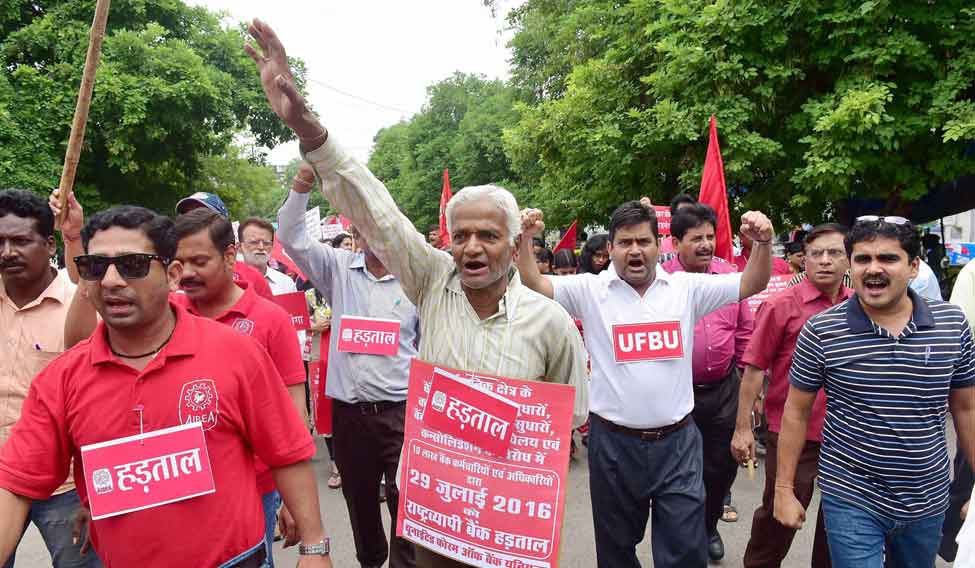One-day strike by a million bank employees, protesting against government-initiated banking reforms, has hit the banking services
Banking service in the country came to a near halt as about 10 lakh employees in 80,000 branches of public and private sector banks including foreign banks, went on strike on July 29. They were protesting against banking reforms initiated by the Union government. The strike was called by the United Forum of Bank Unions, representing nine major trade unions.
Services hit
Though the unions say that they are working tomorrow, the end-of-the month strike has hit banking services including crediting of salaries and pension. Cash transactions through 2,00,000 ATMs have not been affected much. Treasury operations and government bond auction of Rs15,000 crore are unlikely to have been affected, reports said.
Banks are bleeding
While bad loans have risen to the tune of about Rs13 lakh crore, savings have dropped. Gross non-performing assets (NPA) of public sector have increased to Rs40,500 crore from Rs16,261 crore in March 2015.
Managements for reforms
Opposing the move of trade unions, Indian Banks Association (IBA), representative body of 201 bank managements in India, had sought legal means and was armed with a restraint order against an earlier strike call. The unions had to withdraw their two-day strike call for July 12 and 13.
Unions demand
While the unions want more government funds for public sector banks, they say government favours privatisation of public sector banks (PSB).
The unions accused the government of pursuing unwarranted banking reform detrimental to the interests of the banking sector. They blame that government is backing out from banking sector with inadequate capital investment, thus enforcing privatisation of banks.
The unions are against the merger of five banks—State Bank of Bikaner and Jaipur, State Bank of Travancore, State Bank of Patiala, State Bank of Mysore and State Bank of Hyderabad with State Bank of India. Public sector IDBI will turn a private bank with the government decision to reduce its stake to less than 49 per cent.
Employees are say that government and the RBI are not taking satisfactory measures to recover bad loans of PSBs amounting to Rs5,39,995 crore (as on March 31, 2016). The Government is issuing licences to corporate houses to start new banks. The unions say this is intended to hand over the banks to very same defaulters.
The employees want the government to publish the list of wilful defaulters in order to shame them and declare them as criminal offenders. “Government is deliberately protecting default by the corporates and big business enterprises,” said the unions. They say that that the default by Vijay Mallya is just the tip of the iceberg and there are bigger sharks in the ocean of bad loans in the banks.
Government stand
Banks are accumulating losses and there is a need to make them competitive in the global economy, argues IBA. Consolidation of the banks is one solution to loss-making PSBs. The government wants to increase private investment to tide over the situation created by massive bad loans.
Mega merger of 26 banks
The government has also proposed a merger of small public sector banks with six major lenders. State Bank of India, Punjab National Bank, Canara Bank, Union Bank, Bank of Baroda and Bank of India will lead the merger. Unions say consolidation of banks will make them bigger, but will hurt services to the common man.




